

In the gig economy, recruitment agencies are the gangmasters. “Recruitment agency: an organisation that matches employers to employees and vice versa; an intermediary in the labour market” – or so the dictionary tells us.
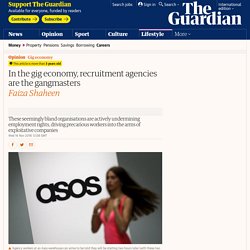
But, given recent findings that agencies are using aggressive tax avoidance schemes at a time when new benefit caps are driving single parents into poverty; that some agencies have conned low-paid temporary workers into buying worthless accident insurance; and, from my own research, that agencies are enabling the undercutting of workers’ rights and wages by pitting migrant workers against local people, it would be truer to life if we described recruitment agencies as arbiters of capitalism and the mass exploitation of workers. It is estimated that recruitment agencies employ 1.2 million people every day. The Rise of the Gig Economy: What it Means for Your Recruitment Agency.
The gig or freelance economy has truly taken hold in Australia, according to data from the 2016 consensus, and recruitment agencies are having to adapt and evolve to the challenges and opportunities this presents.
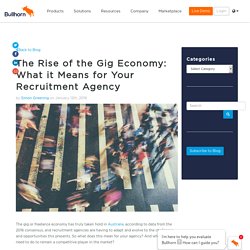
So what does this mean for your agency? And what do you need to do to remain a competitive player in the market? The Hyper Speed Labour Market The increasing polarisation of the workforce into low and highly skilled labour is set to heighten the challenges currently posed by the gig economy, according to new research from SEEK. While the net effect of this will result in less labour, according to Simon Lusted, head of strategy at SEEK, it also means that “we’re going to face a world where labour is far more fluid across firms”.
Understand Gig Workers’ Pain Points While freelance workers choose this employment model because it affords greater flexibility, it does also present challenges. What Do You Have That Others Don’t? Flexing some labour market muscle: Managing the growing significance of the gig economy. THE GROWING SIGNIFICANCE of the gig economy is reflected in Ireland’s latest Labour Force Survey, as zero unemployment and skills shortages demand new flexibility on the part of recruiters, employers and employees.
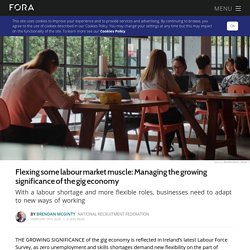
The number of employees who are agency workers increased by 4.8% in the third quarter 2019, over the same period last year, according to the most recent labour market survey data published by the Central Statistics Office last November. While agency staff represent a relatively small proportion of Ireland’s overall workforce, Ireland is seen to be following a global trend towards more flexible labour markets and labour supply, with growing numbers of contractors, consultants and freelancers in our new just-in-time, on-demand workforce. Growth in the numbers of contingent workers allows industry and the public sector to adapt to market needs efficiently and cost-effectively, which crucially supports business competitiveness. Full Employment Women at work.
The roles and characteristics of ‘Gigs’ – Creating beneficial relationships between freelancers and their hiring organisations - Arjen van Witteloostuijn. In this video Arjen van Witteloostuijn discusses his research presented at the Annual Global Research Workshop on Freelancing and Self-Employment 2016.
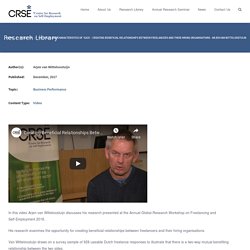
His research examines the opportunity for creating beneficial relationships between freelancers and their hiring organisations. Van Witteloostuijn draws on a survey sample of 928 useable Dutch freelance responses to illustrate that there is a two-way mutual benefiting relationship between the two sides. His key findings point that an organisational fit can generate a win-win relationship enabling freelancers to grow in their progressive career while further enriching the knowledge structure of the hiring organisation by sharing their practical experience. Van Witteloostuijn. A. (2016), ‘The roles and characteristics of ‘Gigs’ – creating beneficial relationships between freelancers and their hiring organisations' [Online Video], 25 November 2016, Available from: Getting the giggers: Recruitment and the gig economy. Siân Harrington, August 14, 2019 The alternative workforce is growing but organisations are unsure how to recruit gig workers Are we close to a time when the traditional employee will no longer make up the bulk of our workforce?
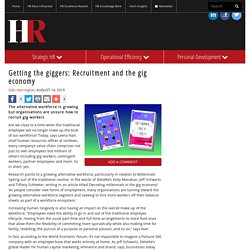
Today, says Leena Nair, chief human resources officer at Unilever, every company’s value chain comprises not just its own employees but millions of others including gig workers, contingent workers, partner employees and more. So in short: yes. Research points to a growing alternative workforce, particularly in relation to Millennials ‘opting out’ of the traditional routine.
Increasing human longevity is also having an impact on the overall make-up of the workforce. In fact, according to the World Economic Forum, it’s not impossible to imagine a Fortune 500 company with an employee base that works entirely at home. So how do recruiters tap into these on-demand workers, freelancers, independent contractors and consultants? The agency portal Build your own network.